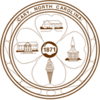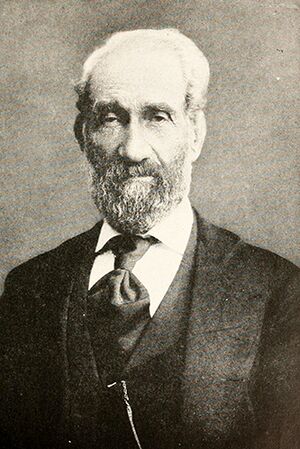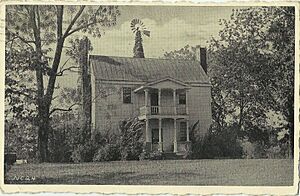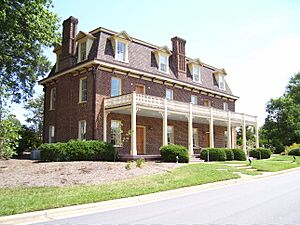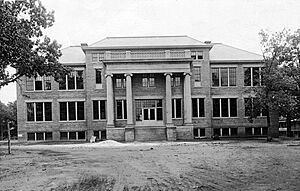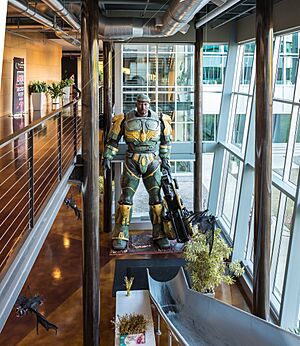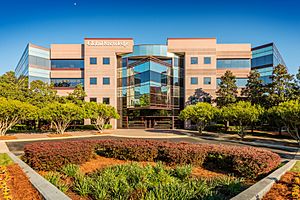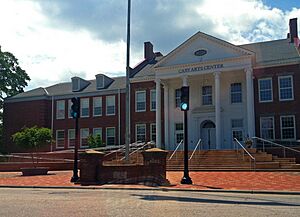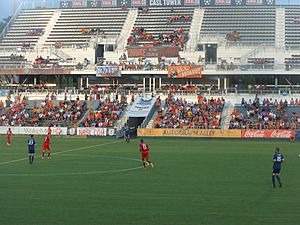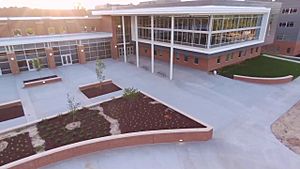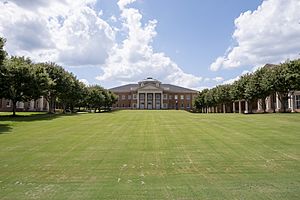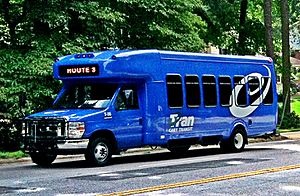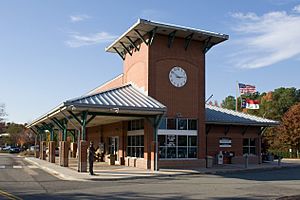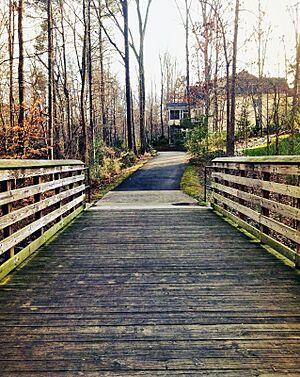Cary, North Carolina facts for kids
Quick facts for kids
Cary
|
|||||
|---|---|---|---|---|---|
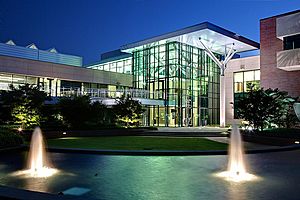
Cary Town Hall
|
|||||
|
|||||
| Motto(s):
"Live Inspired"
|
|||||
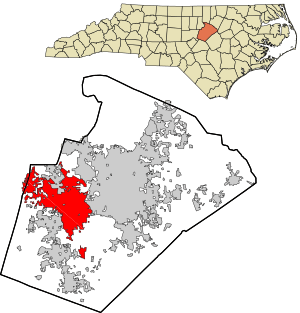
Location in Wake County and North Carolina
|
|||||
| Country | United States | ||||
| State | North Carolina | ||||
| Counties | |||||
| Founded | 1750 | ||||
| Incorporated | April 3, 1871 | ||||
| Named for | Samuel Fenton Cary | ||||
| Government | |||||
| • Type | Council-manager government | ||||
| Area | |||||
| • Total | 61.05 sq mi (158.12 km2) | ||||
| • Land | 59.94 sq mi (155.24 km2) | ||||
| • Water | 1.11 sq mi (2.88 km2) 1.82% | ||||
| Elevation | 410 ft (120 m) | ||||
| Population
(2020)
|
|||||
| • Total | 174,721 | ||||
| • Estimate
(2023)
|
180,010 | ||||
| • Rank | 150th in the United States 7th in North Carolina |
||||
| • Density | 2,915.03/sq mi (1,125.49/km2) | ||||
| Demonym(s) | Caryite | ||||
| Time zone | UTC-5 (EST) | ||||
| • Summer (DST) | UTC-4 (EDT) | ||||
| ZIP Codes |
27511–27513, 27518, 27519
|
||||
| Area code | 919, 984 | ||||
| FIPS code | 37-10740 | ||||
| GNIS ID | 2406229 | ||||
Cary is a town located in North Carolina, USA. It is mostly in Wake County, but also reaches into Chatham County and Durham County. Cary is part of the larger Raleigh-Cary metropolitan area. In 2020, about 174,721 people lived there, making it the seventh-largest town in North Carolina. By 2023, the population grew to 180,010.
Cary started as a small village near a railroad. It became famous for its schools in the late 1800s and early 1900s. In 1907, Cary High School was the first public high school in North Carolina to get state funding. When the Research Triangle Park was built nearby in 1959, Cary grew very quickly. Its population doubled, then tripled, and then doubled again over the next few decades! Today, many technology companies, including the world's largest private software company, are located in Cary.
Cary is known for having many educated adults; about 68.4% have a college degree or higher. In 2021, it was named the safest mid-sized place to live in the United States. Families in Cary also have a higher average income compared to the rest of the county and state.
Contents
History of Cary
Long ago, the Tuscarora and Catawba tribes lived in the area that is now Cary. Their populations decreased a lot after Europeans arrived, bringing diseases like smallpox.
In the 1750s, a man named John Bradford opened an inn, which was like a hotel for travelers. This place was called Bradford's Ordinary. Most of the land belonged to two men, both named Nathaniel Jones. After the American Revolutionary War, the community was on the main road between the new capital city of Raleigh and the University of North Carolina at Chapel Hill. Later, Eli Yates added a mill, and Rufus Jones started the first free school in the 1840s.
In 1854, the North Carolina Railroad came through the area, followed by the Chatham Railroad in 1868. These railroads were mostly built by enslaved people. Allison Francis Page, a farmer and lumberman, bought 300 acres of land around where the railroads would meet. He built his home, a sawmill, and a general store. Page also gave 10 acres for a train station.
The community had many unofficial names like Page's Siding. In 1856, Page opened a post office and became the first postmaster. He officially named the town Cary. He chose this name because he admired Samuel Fenton Cary, a leader who spoke out against alcohol.
The American Civil War reached Cary on April 16, 1865. This was the same day that Confederate General Robert E. Lee surrendered. Union General William Tecumseh Sherman's troops arrived in Cary. When they came, enslaved people in Cary became free. Some joined the U.S. Colored Troops.
After the Civil War, Cary grew more because of the Chatham Railroad junction. Around 1868, the first train station was built. Page also planned out streets and lots for homes. Many men in Cary worked for the railroads. Other businesses included factories for furniture, shingles, shoes, and bricks. Page also built a hotel for train passengers, which is now known as the Page-Walker Hotel.
Page and others started a private school called Cary Academy in 1870. The town also got new churches and two free schools for white children and two for black children.
Cary officially became a town on April 3, 1871. Allison Francis Page was its first mayor. The town's first laws banned the sale of whiskey. This ban stayed in place until 1964.
More railroads came to Cary in 1879, helping the town grow even more. In 1896, Cary Academy became a private high school. In 1907, it became the first state-funded public high school in North Carolina. A new brick school building was built in 1913, which is now the Cary Arts Center.
In the 1920s, paved roads connected Cary to nearby cities like Raleigh and Durham. This made it easier for people to travel for work, and Cary's population grew a lot. Electricity came to Cary in 1921. The town also got its first housing developments, a volunteer fire department, and a water and sewage system. During the Great Depression, the town faced tough times, and its bank failed.
In the 1930s, a new research farm helped Cary's farmers. A local garden club started growing gourds and showed them at the North Carolina State Fair. After their first festival in 1944, they won many awards at a national festival. This earned Cary the nickname "Gourd Capital of the World." Today, the annual North Carolina Gourd Festival is held at the State Fairgrounds.
After World War II, Cary started to attract factories, like the Taylor Biscuit Company. Cary also began to expand its boundaries and plan for future growth. All the streets were paved by the early 1950s, and new neighborhoods started to appear. The town got its first supermarket in 1950 and a public library in 1960.
Cary's population continued to grow rapidly in the 1960s and 1970s after the Research Triangle Park (RTP) opened nearby. The state even built a four-lane road to connect Cary to RTP. Cary put rules in place to manage this fast growth, like zoning laws and plans for how land could be used. In 1963, Cary High School was the first school in Wake County to allow students of all races.
In 1971, Cary started using a new way to plan communities called Planned Unit Development (PUD). This allows developers to plan an entire community, including where homes, schools, and shops will be, before building starts. The Kildaire Farms development was North Carolina's first PUD.
By 1970, Cary's population had grown to 7,686. To keep its small-town feel, the town created a commission to regulate the look of downtown. In the 1980s, Cary encouraged businesses to build within its limits to help the town's finances. The PUD model became very popular, with many more communities being built this way.
By 2000, Cary's population was 94,536. The town council started a plan to protect its historic buildings and areas. Today, Cary has three areas recognized for their history: the Carpenter Historic District, the Green Level Historic District, and the Cary Historic District.
Geography of Cary
Cary is located in the piedmont region of North Carolina. Most of the town is in western Wake County. Smaller parts are in Chatham County and Durham County. Cary covers about 61 square miles, with most of it being land and a small part being water.
Cary is surrounded by other towns. Raleigh is to the north and east. Morrisville and the Research Triangle Park are generally to the north. Apex and Holly Springs are to the south. The Jordan Lake area is to the west.
The land in Cary has gentle to moderate hills with narrow valleys. Some areas in western Cary have steeper slopes. The average height above sea level in Cary is about 495 feet.
Three main creeks flow through Cary: Crabtree, Swift, and Walnut. These creeks all flow into the Neuse River. There are also small lakes, like Lake Crabtree, which helps control floods. Jordan Lake is a large lake on the western edge of Cary.
Most of Cary is developed with neighborhoods. However, some areas still have forests or farms, especially in western Cary. Many parks and older neighborhoods have a mix of evergreen and leafy trees because protecting trees was important when they were designed.
Climate in Cary
Cary has a humid subtropical climate. This means it has hot summers and mildly cold winters. It gets about 3.2 inches of snow each year. There are also several months of pleasant weather. Temperatures can range from very cold (single digits Fahrenheit) to very hot (over 100 degrees Fahrenheit). Sometimes, tropical storms can affect Cary, but they usually weaken a lot by the time they reach the town. Hurricane Fran in 1996 caused a lot of damage in the area.
| Climate data for Cary, North Carolina (1991–2020 normals, extremes 2000–present) | |||||||||||||
|---|---|---|---|---|---|---|---|---|---|---|---|---|---|
| Month | Jan | Feb | Mar | Apr | May | Jun | Jul | Aug | Sep | Oct | Nov | Dec | Year |
| Record high °F (°C) | 80 (27) |
80 (27) |
89 (32) |
92 (33) |
96 (36) |
101 (38) |
101 (38) |
101 (38) |
97 (36) |
97 (36) |
85 (29) |
78 (26) |
101 (38) |
| Mean daily maximum °F (°C) | 50.2 (10.1) |
54.0 (12.2) |
61.4 (16.3) |
71.1 (21.7) |
78.1 (25.6) |
84.9 (29.4) |
88.2 (31.2) |
86.0 (30.0) |
80.3 (26.8) |
71.1 (21.7) |
61.5 (16.4) |
53.3 (11.8) |
70.0 (21.1) |
| Daily mean °F (°C) | 40.7 (4.8) |
43.3 (6.3) |
49.9 (9.9) |
59.0 (15.0) |
67.2 (19.6) |
74.8 (23.8) |
78.6 (25.9) |
76.9 (24.9) |
70.9 (21.6) |
60.4 (15.8) |
50.3 (10.2) |
43.7 (6.5) |
59.6 (15.3) |
| Mean daily minimum °F (°C) | 31.2 (−0.4) |
32.6 (0.3) |
38.5 (3.6) |
46.8 (8.2) |
56.3 (13.5) |
64.6 (18.1) |
69.0 (20.6) |
67.9 (19.9) |
61.5 (16.4) |
49.7 (9.8) |
39.2 (4.0) |
34.1 (1.2) |
49.3 (9.6) |
| Record low °F (°C) | 6 (−14) |
7 (−14) |
15 (−9) |
27 (−3) |
38 (3) |
49 (9) |
58 (14) |
53 (12) |
44 (7) |
30 (−1) |
20 (−7) |
12 (−11) |
6 (−14) |
| Average precipitation inches (mm) | 3.54 (90) |
2.90 (74) |
4.04 (103) |
3.73 (95) |
3.74 (95) |
4.59 (117) |
5.31 (135) |
4.81 (122) |
5.57 (141) |
3.54 (90) |
3.50 (89) |
3.53 (90) |
48.80 (1,240) |
| Source: NOAA | |||||||||||||
People of Cary
| Historical population | |||
|---|---|---|---|
| Census | Pop. | %± | |
| 1880 | 316 | — | |
| 1890 | 423 | 33.9% | |
| 1900 | 333 | −21.3% | |
| 1910 | 383 | 15.0% | |
| 1920 | 645 | 68.4% | |
| 1930 | 909 | 40.9% | |
| 1940 | 1,141 | 25.5% | |
| 1950 | 1,446 | 26.7% | |
| 1960 | 3,356 | 132.1% | |
| 1970 | 7,686 | 129.0% | |
| 1980 | 21,763 | 183.2% | |
| 1990 | 43,858 | 101.5% | |
| 2000 | 94,536 | 115.6% | |
| 2010 | 135,234 | 43.1% | |
| 2020 | 174,721 | 29.2% | |
| 2023 (est.) | 180,010 | 33.1% | |
| U.S. Decennial Census 2020 |
|||
In 2020, there were 174,721 people living in Cary in 62,789 homes. This means there are about 2,949.7 people per square mile.
Many adults in Cary are highly educated. About 68.4% of adults aged 25 or older have a bachelor's degree or higher. Also, almost all homes in Cary (98.6%) have a computer, and 96.0% have high-speed internet.
Cary's Diverse Population
| Race / Ethnicity (NH = Non-Hispanic) | Pop 2000 | Pop 2010 | Pop 2020 | % 2000 | % 2010 | % 2020 |
|---|---|---|---|---|---|---|
| White alone (NH) | 75,299 | 93,202 | 99,357 | 79.65% | 68.92% | 56.87% |
| Black or African American alone (NH) | 5,744 | 10,485 | 13,506 | 6.08% | 7.75% | 7.73% |
| Native American or Alaska Native alone (NH) | 197 | 284 | 302 | 0.21% | 0.21% | 0.17% |
| Asian alone (NH) | 7,636 | 17,620 | 39,035 | 8.08% | 13.03% | 22.34% |
| Pacific Islander alone (NH) | 25 | 39 | 76 | 0.03% | 0.03% | 0.04% |
| Some Other Race alone (NH) | 173 | 334 | 969 | 0.18% | 0.25% | 0.55% |
| Mixed Race or Multi-Racial (NH) | 1,415 | 2,906 | 7,100 | 1.50% | 2.15% | 4.06% |
| Hispanic or Latino (any race) | 4,047 | 10,364 | 14,376 | 4.28% | 7.66% | 8.23% |
| Total | 94,536 | 135,234 | 174,721 | 100.00% | 100.00% | 100.00% |
Because many people moved to Cary from other states for jobs in the Research Triangle Park, some people from North Carolina used to jokingly call Cary the "Containment Area for Relocated Yankees." As of 2020, about 28.97% of Cary's population was born in North Carolina, and 22.13% were born in other countries.
Economy of Cary
In 2021, the average income for a household in Cary was $113,782. This is higher than the average for the county and the state. Only a small number of Cary residents (4.4%) live in poverty. Most homes (66.8%) are owned by the people who live in them. However, the cost of housing in Cary has gone up a lot over the last twenty years. The average rent is about $1,392 per month.
Companies in Cary
Many well-known technology companies have offices in Cary. These include ABB, Epic Games (famous for video games like Fortnite), Garmin, HCL Technologies, Lockheed Martin, SAS Institute, and Xerox.
Other companies in Cary include Austin Foods/Kellogg's, which makes snacks, and Lord Corporation, which makes special materials for planes and cars. Cotton Incorporated is a non-profit group in Cary that researches and promotes the use of cotton around the world.
Top Employers in Cary
Here are the companies that employ the most people in Cary:
| # | Employer | # of Employees |
|---|---|---|
| 1 | SAS Institute | 5,567 |
| 2 | MetLife | 3,100 |
| 3 | Verizon | 2,000 |
| 4 | Siemens Healthineers | 1,600 |
| 5 | HCL Technologies | 1,500 |
| 6 | Town of Cary | 1,152 |
| 7 | Precision Walls | 1,015 |
| 8 | Global Knowledge Training | 1,000 |
| 9 | American Airlines Reservation Center | 964 |
| 10 | ABB | 900 |
| 10 | Austin Quality Foods/Kellogg's | 900 |
Arts and Culture in Cary
Art and Museums
Cary has over forty pieces of public art displayed around town. Many town buildings have art galleries with changing exhibits. These include the Bond Park Community Center, Cary Arts Center, and the Page–Walker Arts & History Center.
The Cary History Museum is located in the Page-Walker Arts and History Center. It shows a timeline of local history. The Stevens Nature Center at Hemlock Bluffs Nature Preserve has fun exhibits about nature and history.
Cary also has places for performances, like the Cary Arts Center and Koka Booth Amphitheatre. The Cary Theater is a renovated movie theater that now hosts cultural events.
Events and Festivals
Cary hosts many public events throughout the year. Since 1959, Cary Band Day has brought high school marching bands from all over the Southeast to compete. Cary also has two arts and crafts festivals: Spring Daze and Lazy Daze. For Lazy Daze, the main downtown roads are closed for two days, a tradition since 1976.
Many events celebrate Cary's diverse cultures. The annual Diwali Celebration, the Indian Festival of Light, features Indian art, music, dance, and food. The Greater Triangle Area Dragon Boat Festival includes displays, food, performances, and exciting dragon boat races. The Ritmo Latino Festival showcases music, art, dance, and food from Hispanic cultures. The North Carolina Chinese Lantern Festival is a popular event that lights up the night with over 2,500 handcrafted silk lanterns to celebrate the Chinese New Year.
Architecture in Cary
The oldest buildings in Cary, like the Nancy Jones House (around 1803) and the Utley–Council House (around 1820), are examples of early American architecture. The Page–Walker Hotel, built around 1868, is now a public museum.
The Cary Historic District has many interesting buildings from the 1800s and 1900s. These include the Ivey-Ellington House (around 1870) and the Queen Anne style Sam–Jones cottage (around 1902). The former Cary High School, built in 1939, is a large, grand building that is now the Cary Arts Center.
The Carpenter Historic District in western Cary has buildings from 1895 to 1933. The main building is the Carpenter Farm Supply Company, a large brick store built around 1895. Other buildings include old houses and farm structures.
Cary's Green Level Historic District is also in western Cary. It includes buildings like the 1907 Green Level Baptist Church, which is a great example of old church architecture. There are also historic farms and stores, like the Alious Mills Store built around 1916.
SAS Institute has built many modern, tall buildings in Cary, but they are set in a large, park-like area. Their buildings are designed to be modern and eco-friendly. For example, Building Q is a six-story office building with a green roof and lots of natural light.
Cary is also home to the Sri Venkateswara Temple. This Hindu temple has an 87-foot-tall entrance tower, making it the tallest of its kind in the United States. It is modeled after a famous temple in India.
Sports in Cary
Cary has two professional sports teams: the North Carolina Courage (women's soccer) and the North Carolina FC (men's soccer). Both teams play at Sahlen's Stadium at WakeMed Soccer Park in Cary.
| Club | Sport | Founded | League | Venue |
|---|---|---|---|---|
| North Carolina FC | Soccer | 2006 | USL League One | WakeMed Soccer Park |
| North Carolina Courage | Soccer | 2009 | NWSL | WakeMed Soccer Park |
WakeMed Soccer Park has also hosted college soccer championships. Since 2007, Cary has been home to the USA Baseball National Training Complex. This complex hosts college baseball tournaments.
Parks and Recreation in Cary
Cary has over thirty public parks and natural areas. Some popular parks include the new Downtown Cary Park, Fred G. Bond Metro Park, Hemlock Bluffs Nature Preserve, and William B. Umstead State Park.
Tennis in Cary
The Cary Tennis Park is one of the largest public tennis facilities in the southeastern United States. It has 32 courts, including a championship stadium. In 2019, it was recognized for its excellent construction by the United States Tennis Association.
Education in Cary
Public Schools
The Wake County Public School System, based in Cary, is the largest public school system in North Carolina. Cary has five public high schools: Cary High School, Green Hope High School, Green Level High School, Middle Creek High School, and Panther Creek High School. The town also has seven middle schools and nineteen elementary schools.
Cary has three charter schools: Cardinal Charter Academy, Peak Charter Academy, and Triangle Math and Science Academy.
Private Schools
- Cary Academy (grades 6–12)
- Cary Christian School (grades K–12)
- Chesterbrook Academy (grades K–5)
- Grace Christian School Upper Campus (grades 7–12)
- Heartwood Montessori School (grades K–12)
- Hopewell Academy (grades 6–12)
- Resurrection Lutheran School (grades K–8)
- Saint Michael the Archangel Catholic School (grades PK–8)
Colleges and Universities
Wake Technical Community College has its Western Wake Campus located in Cary.
Transportation in Cary
Public Transit
GoCary provides bus service within the town with six routes. There is also a special door-to-door service for older citizens and people with disabilities. GoTriangle operates buses that connect Cary to other towns like Raleigh, Durham, and Chapel Hill.
Train Service
Amtrak passenger trains stop at the Cary Station. These trains connect Cary to cities like Charlotte, New York City, and Miami. The station was built in 1995 and expanded in 2011.
Biking in Cary
In 2010, Cary was recognized as a "Bicycle-Friendly Community." This means it has safe paths and facilities for bikers and encourages people to bike for fun and transportation. Cary has over 200 miles of bike-friendly roads and greenways. Two major bike routes, U.S. Bicycle Route 1 and N.C. Bicycle Route #2, pass through Cary.
Walking in Cary
Cary has a network of 82 miles of greenways and trails. These paths connect neighborhoods and parks throughout the town. The 23-mile American Tobacco Trail, built on an old railroad line, also goes through parts of Cary.
Air Travel
The Raleigh–Durham International Airport (RDU) is located north of Cary. Cary provides water to the airport. RDU offers flights to over 35 places and served nearly 8.8 million passengers in 2021.
Major Roads
Cary is connected to other areas by major highways like Interstate 40, U.S. 1, and U.S. 64. State highways like NC 54, NC 55, and NC 540 also run through Cary. The Cary Parkway is another important road in the town.
Smart City Technology in Cary
In 2016, Cary started its Smart City Program to test new "smart" technologies. These technologies use sensors and the internet to make the town better. For example, Cary has sensors in public parking lots that show available spots. Smart street lights dim when not needed, saving energy. Smart trash cans send messages when they are full. There is also free outdoor Wi-Fi in some areas.
One of the first town-wide smart projects was a water monitoring system. It uses technology from SAS Institute to detect leaks, which saves water. Cary and SAS also worked together on a smart system that alerts people about stormwater floods. This project won awards in 2020.
In 2021, Cary installed smart technologies that help emergency vehicles get through traffic lights, pedestrian crossings, and school zones faster. This was the first system like it in North Carolina.
Cary is considered one of the "smartest towns" in the United States because of its focus on using technology to improve community services.
Notable People from Cary
- Brian Ackley, soccer player
- Gale Adcock, politician
- Nida Allam, politician
- Vernetta Alston, politician
- John Altschuler, TV and film writer
- Debbie Antonelli, sports commentator
- Reggie Barnes, former pro-skateboarder
- Fred Bond Jr., politician
- Marshall Brain, TV host and author
- Chucky Brown, former professional basketball player
- Chris Castor, former professional football player
- Héctor Cotto, Olympic track and field athlete
- Claire Curzan, Olympic swimmer
- John Custer, record producer and musician
- Anoop Desai, singer-songwriter
- Spright Dowell, former university president
- Tim Downs, author and comic strip artist
- Chris Flemmings, professional basketball player
- Kendall Fletcher, professional soccer player
- Ben Fountain, author
- James Goodnight, co-founder and CEO of SAS Institute
- Linda Hinkleman Gunter, former politician
- Vance Heafner, professional golfer
- Charlotte Hook, swimmer
- Andrew Hubner, author
- Justin Jedlica, model and businessman
- Sabrina Jeffries, author
- Jan Johansson, bluegrass musician
- Isaiah Johnson, professional football player
- Alfred Daniel Jones, former U.S. Consul General
- Greg Jones, professional baseball player
- Peter Kilpatrick, university president
- Scott Kooistra, professional football player
- Glen Lang, former professional hockey player
- Travis May, technology company founder
- Luke Maye, professional basketball player
- Trey Murphy III, professional basketball player
- Wiley Nickel, politician
- Matt Oberst, musician
- Robert N. Page, politician and congressman
- Walter Hines Page, journalist and U.S. Ambassador
- Hilda Pinnix–Ragland, business executive
- Max Povse, professional baseball player
- Bevin Prince, actress
- Morgan Reid, professional soccer player
- Justin Ress, competitive swimmer
- Anthony Rush, NFL defensive tackle
- Saiyan (Ryan Danford), former professional esports player
- John Sall, co-founder of SAS Institute
- Mark Scalf, baseball coach
- Zack Schilawski, former pro soccer player
- Ainsley Seiger, actress
- Vic Sorrell, former MLB pitcher
- Ryan Spaulding, professional soccer player
- Azurá Stevens, professional basketball player
- Tim Sweeney, founder and CEO of Epic Games
- Rysa Walker, author
- Aaron Ward, former professional hockey player
- Curtis Waters, recording artist
- Harold Weinbrecht, politician
- Jennifer Weiss, former politician
- Kay Yow, former head coach of women's basketball at North Carolina State University
- Katie Zaferes, professional triathlete
Sister Cities
Cary has special long-term relationships with five "sister cities" around the world:
 Le Touquet-Paris-Plage, France (since 1992)
Le Touquet-Paris-Plage, France (since 1992) Hsinchu, Taiwan (since 1993)
Hsinchu, Taiwan (since 1993) County Meath, Ireland (since 2001)
County Meath, Ireland (since 2001) Markham, Canada (since 2002)
Markham, Canada (since 2002) Bandırma, Turkey (since 2022)
Bandırma, Turkey (since 2022)
See also
 In Spanish: Cary (Carolina del Norte) para niños
In Spanish: Cary (Carolina del Norte) para niños
 | Dorothy Vaughan |
 | Charles Henry Turner |
 | Hildrus Poindexter |
 | Henry Cecil McBay |



